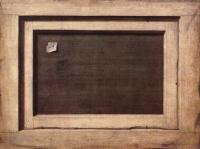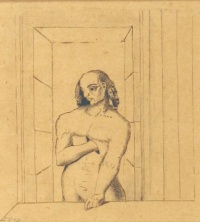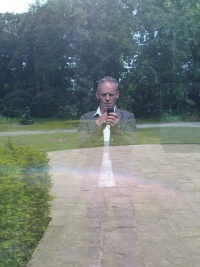Self
From The Art and Popular Culture Encyclopedia
| Revision as of 09:12, 8 July 2022 Jahsonic (Talk | contribs) ← Previous diff |
Current revision Jahsonic (Talk | contribs) |
||
| Line 5: | Line 5: | ||
| <hr> | <hr> | ||
| "If the little savage were left to him[[self]] so that he retained all his imbecility, uniting the little reason possessed by a child in the cradle with the passionate violence in a man thirty years old, he'd [[Oedipus complex|wring his father's neck and sleep with his mother]]." --''[[Rameau's Nephew]]'' (1805) by Diderot | "If the little savage were left to him[[self]] so that he retained all his imbecility, uniting the little reason possessed by a child in the cradle with the passionate violence in a man thirty years old, he'd [[Oedipus complex|wring his father's neck and sleep with his mother]]." --''[[Rameau's Nephew]]'' (1805) by Diderot | ||
| + | <hr> | ||
| + | I celebrate myself, and sing my[[self]],<br> | ||
| + | And what I assume you shall assume,<br> | ||
| + | For every atom belonging to me as good belongs to you.<br> | ||
| + | |||
| + | --"[[Song of Myself]]" by Whitman | ||
| + | |} | ||
| |} | |} | ||
Current revision

|
"To be stupid, and selfish, and to have good health are the three requirements for happiness; though if stupidity is lacking, the others are useless" [...] --G. Flaubert "If the little savage were left to himself so that he retained all his imbecility, uniting the little reason possessed by a child in the cradle with the passionate violence in a man thirty years old, he'd wring his father's neck and sleep with his mother." --Rameau's Nephew (1805) by Diderot I celebrate myself, and sing myself, --"Song of Myself" by Whitman |
|}

|
Related e |
|
Featured: |
Self refers to the subject of one's own experience of phenomena: perception, emotions, thoughts; or to an individual person as the object of his own reflective consciousness (plural selves).
Contents |
See also
Sui
Essence of oneself
- Main articles: Self (philosophy), Self (psychology), and Self (sociology)
- Body
- Brain / Mind / Intelligence
- Character
- Experience
- Gender
- Human
- Human condition
- Identity
- Person
- Personality
- Skill
- Virtue
- Wisdom
Self constructs
- Individual
- Personal identity
- Personality
- Personal name
- Self-awareness
- Self-concept
- Self-consciousness
- Self-identity
- Self-image
- Self-ownership
- Self-perception
- Self-realization
- Self-worth
Stages of life
- 1. Infancy
- 2. Childhood
- 3. Adolescence
- 4. Adulthood
- 5. Middle age
- 6. Old age
Major life events
- 1. Birth
- 2. Primary school
- 3. Graduation
- 4. Coming of age
- 5. Employment
- 6. Marriage
- 7. Parenthood
- 8. Retirement
- 9. Death
See also
- Anatta
- Aseity
- Ego (disambiguation)
- Individual
- Individuation
- Outline of self
- Self-awareness
- Sources of the Self
- True self and false self


